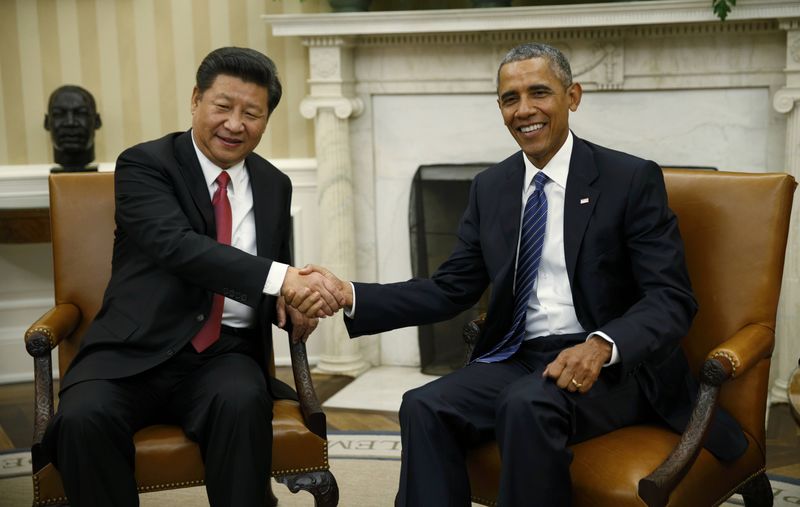By Valerie Volcovici
WASHINGTON (Reuters) - U.S. President Barack Obama and Chinese President Xi Jinping outlined their common vision for a global climate change agreement on Friday, including new steps they will take to deliver on pledges made last year to slash their greenhouse gas emissions.
Those included Xi's announcement that China will launch a national carbon cap-and-trade system in 2017 to help contain the country's emissions, which will build on seven regional pilot markets already operation in China. Such systems put limits on carbon emissions and open up markets for companies to buy and sell the right to produce emissions.
The joint presidential statement was a highlight of a state visit to Washington by Xi, as the two leaders tackled difficult issues such as cyber spying and China's economic policies.
It built on a bilateral announcement on climate change last November, when the United States pledged to reduce its greenhouse gas emissions 26 to 28 percent below 2005 levels by 2025, while China agreed to cap its rising emissions by at least 2030.
The statement aimed to show "the determination of both countries to act decisively to achieve the goals set last year."
China is already the world's largest carbon emitter, but its status as a developing country has meant it is under no obligation to promise carbon cuts, a situation that has irked U.S. politicians and other industrialized nations.
For Obama, securing a new global agreement on climate change that erases some of the divisions between industrialized and emerging economies is a key priority. The deal with China strengthens his hand ahead of a global summit on climate change in Paris in December.
"For the world's two largest economies, energy consumers and carbon emitters to come together like this, there is no reason for other countries, whether developed or developing, not do so as well," Obama told a joint press conference with Xi.
China's proposed cap-and-trade system would create the world's biggest carbon market. Democratic lawmakers tried to pass legislation to create such a system in the United States but it failed to win enough votes in a divided Senate in 2010.
China also announced on Friday that it would channel 20 billion RMB ($3.1 billion) to help developing countries combat and adapt to climate change, a significant financial pledge from an emerging economy. Development charity Oxfam called it a "game-changer" and the environmental group World Resources Institute said it was a "watershed moment" in decades of climate agreement negotiations.
For its part, Washington reaffirmed a pledge it made last year to channel $3 billion into a U.N.-backed Green Climate Fund. But Congressional wrangling over the federal budget threatens to delay the implementation of the pledge.
China, which is the second biggest lender to overseas coal projects, also announced for the first time that it will join the United States, Britain, the World Bank and other countries and institutions to "work towards strictly controlling public investment" in high-carbon projects overseas.
Some environmental groups said this surprise announcement could help members of the Organisation for Economic Co-operation and Development (OECD) reach an agreement on phasing out public finance for coal projects at its next meeting in November.
China and the United States also agreed on the need for an "enhanced transparency system" in a United Nations climate agreement to ensure trust and confidence in the framework to be agreed in Paris in December.
They also said a new global climate deal should require countries to "ramp up" their national emission reduction commitments periodically.
The two countries' collective targets and policies are "crucial steps in a longer-range effort to transition to low-carbon economies," the joint statement said.
Environmental groups welcomed the statement, saying it would help move forward often fraught climate negotiations.

"The prospects for a global climate agreement have brightened," said Andrew Steer, president of the World Resources Institute.